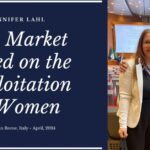1. Coldhearted Sperm “Donor” Glad to No Longer be “Donating”
This story caught my attention because of the sheer callousness it demonstrates in a person who donated his sperm to “help others” have a baby. A happily married father of two who is now a physician laments a law in the U.K. that allows children born of donor sperm or eggs to know their biological identity. He writes, “I am relieved that I donated before 2005 and children conceived using my donated sperm do not have the right to know their parentage. After all, only a minority of them, a discontented minority, feel all their problems in life would be resolved if only they knew who their father was.” So according to him, children don’t have a right to know who their biological parents are—and if they do want to know, it is only because they have some grievance. Not only are his arguments heartless, they are increasingly pointless. As access to DNA testing becomes more and more widespread, the possibility for donors to remain anonymous fades.
2. Let There Be Light!
A new discovery has just revealed that an “explosion of tiny sparks erupts from the egg at the exact moment of conception.” Teresa Woodruff, a researcher at Northwestern University and an ovarian expert (I’ve followed her work on advancements in egg freezing for years), says this is a remarkable finding and will aid fertility medicine in selecting healthy eggs and embryos. While such a use of this new discovery is problematic—it will most likely continue the path of super ovulating women, and both testing and discarding human embryos—it is an amazing discovery that when life begins there is light.
3. Custody Battle Decided in Favor of Gay Couple against Surrogate
American Gordon Lake and his Spanish husband Manuel Santos have won their custody battle for baby Carmen. The baby was born in January 2015, in Thailand from anonymous egg donation, sperm from Lake, and the surrogate womb of Patidta Kusolsang. It has been reported that Kusolsang was concerned about the baby’s wellbeing after learning that the baby was going to a gay couple. Thailand has been at the center of several high-profile surrogacy scandals, which has led to a ban on surrogacy. Gay or straight, married or single, surrogacy continues to demonstrate the many pitfalls in conception by contract. The way forward is for international policies that stop all surrogacy.
4. A Call for Federal Regulation of Sperm Donation
Wendy Kramer, Director of the Donor Sibling Registry, has a piece in Time this week calling for federal regulation of sperm donation. With recent news reports of lawsuits and scandals over people receiving sperm from men with tainted pasts and bad medical histories, Kramer suggests that independent regulatory oversight is needed to ensure “accurate record keeping, limits on the number of children born for any one donor, and compulsory genetic and psychological testing of all donors” and to “protect donors, recipients and offspring.” I understand the desire to address these scandals, but I question whether this will ensure that the children are truly all right.
5. Not Dead Yet Celebrates 20 Years
Disability rights group Not Dead Yet this week marked 20 years of grassroots advocacy opposing the legalization of assisted suicide and euthanasia. Working side-by-side with both religious and secular groups, they have provided powerful testimony of the ways in which many of those who are living with disabilities feel the pressure of laws that suggest some lives are not worth living. I’m sure they would be grateful for any anniversary contribution to support their continued efforts.
This Week in Bioethics Archive
Image by Vladimir Stepanov via flickr (CC BY-NC-ND 2.0)
Author Profile

- Jennifer Lahl, MA, BSN, RN, is founder and president of The Center for Bioethics and Culture Network. Lahl couples her 25 years of experience as a pediatric critical care nurse, a hospital administrator, and a senior-level nursing manager with a deep passion to speak for those who have no voice. Lahl’s writings have appeared in various publications including Cambridge University Press, the San Francisco Chronicle, the Dallas Morning News, and the American Journal of Bioethics. As a field expert, she is routinely interviewed on radio and television including ABC, CBS, PBS, and NPR. She is also called upon to speak alongside lawmakers and members of the scientific community, even being invited to speak to members of the European Parliament in Brussels to address issues of egg trafficking; she has three times addressed the United Nations during the Commission on the Status of Women on egg and womb trafficking.
Latest entries
 Assisted Reproductive TechnologyApril 16, 2024Founder Jennifer Lahl’s Speech on Surrogacy to the Casablanca Declaration
Assisted Reproductive TechnologyApril 16, 2024Founder Jennifer Lahl’s Speech on Surrogacy to the Casablanca Declaration #BigFertilityFebruary 27, 2024No, Alabama Didn’t Ban IVF
#BigFertilityFebruary 27, 2024No, Alabama Didn’t Ban IVF ArticleSeptember 25, 2023The Little Engine That Could
ArticleSeptember 25, 2023The Little Engine That Could SurrogacySeptember 12, 2023Surrogacy Scandals Continue
SurrogacySeptember 12, 2023Surrogacy Scandals Continue

